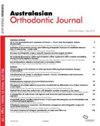Dysbiotic changes of periodontal pathogens in patients wearing conventional and self-ligating orthodontic appliances
IF 0.9
4区 医学
Q4 DENTISTRY, ORAL SURGERY & MEDICINE
引用次数: 0
Abstract
Abstract Objective: This study aimed to analyse dysbiotic changes of periodontal pathogenic bacteria and their relationship with different types of fixed orthodontic appliances in a population located in Northwestern Mexico. Methods: Three groups of patients were identified: a control group without orthodontic appliances (C), a conventional-ligating appliance group (CLA), and a self-ligating appliance group (SLA). Periodontal biofilm samples were collected for DNA extraction to identify the presence and load of Treponema denticola, Prevotella intermedia, and Fusobacterium nucleatum, using a quantitative real-time PCR technique. Results: A total of 92 patients were included. The results showed that F. nucleatum was present in all groups including the control patients (C 96%, CLA 100%, and SLA 67%, respectively). Female participants displayed a higher frequency of periodontal pathogens than males, but males were more affected by F. nucleatum. In addition, the presence of T. denticola and P. intermedia was time-dependent, being more frequent in patients in treatment for longer than 12 months whereas CLA showed 74% and 78% of positive samples and SLA showed 78% and 89%, respectively. F. nucleatum was present in 100% of CLA samples before and after 12 months of treatment and its load was higher in the SLA group after 12 months. Conclusions: Dysbiotic changes that could affect the periodontal tissues were seen in patients wearing orthodontic appliances. The frequency of F. nucleatum was significantly higher in CLA and noted with a greater load in SLA. In addition, female participants showed a higher frequency of periodontal pathogens while male subjects were more affected by F. nucleatum. As expected, treatment for longer than 12 months correlated with a higher frequency of all periodontal pathogens. The results support the concept that dysbiosis leading to periodontal disease can be caused by the rise of a dominant species, instead of the appearance of a new species.使用常规和自结扎正畸矫治器患者牙周病原菌的变化
摘要目的:本研究旨在分析墨西哥西北部人群牙周致病菌的生态失调变化及其与不同类型固定正畸矫治器的关系。方法:将患者分为三组:无正畸矫治器对照组(C)、常规结扎矫治器组(CLA)和自结扎矫治器组(SLA)。收集牙周生物膜样本进行DNA提取,采用实时荧光定量PCR技术检测密螺旋体、中普雷沃氏菌和核梭杆菌的存在和载量。结果:共纳入92例患者。结果表明,除对照组外,各组均有具核梭菌(c96 %, CLA 100%, SLA 67%)。女性参与者比男性表现出更高的牙周病原体频率,但男性更容易受到具核梭菌的影响。此外,齿状螺旋体和中间螺旋体的存在具有时间依赖性,在治疗时间超过12个月的患者中更为常见,而CLA阳性样本分别为74%和78%,SLA阳性样本分别为78%和89%。治疗前后12个月,100%的CLA样品中均存在核仁梭菌,且治疗12个月后SLA组核仁梭菌的负载量更高。结论:佩戴正畸矫治器的患者可出现影响牙周组织的益生菌改变。在CLA和SLA中,核仁梭菌的频率显著较高。此外,女性受试者的牙周病原体发病率较高,而男性受试者的牙周病原体发病率较高。正如预期的那样,治疗时间超过12个月与所有牙周病原体的高频率相关。研究结果支持这样一种观点,即导致牙周病的生态失调可能是由优势物种的崛起引起的,而不是新物种的出现。
本文章由计算机程序翻译,如有差异,请以英文原文为准。
求助全文
约1分钟内获得全文
求助全文
来源期刊

Australasian Orthodontic Journal
Dentistry-Orthodontics
CiteScore
0.80
自引率
25.00%
发文量
24
期刊介绍:
The Australasian Orthodontic Journal (AOJ) is the official scientific publication of the Australian Society of Orthodontists.
Previously titled the Australian Orthodontic Journal, the name of the publication was changed in 2017 to provide the region with additional representation because of a substantial increase in the number of submitted overseas'' manuscripts. The volume and issue numbers continue in sequence and only the ISSN numbers have been updated.
The AOJ publishes original research papers, clinical reports, book reviews, abstracts from other journals, and other material which is of interest to orthodontists and is in the interest of their continuing education. It is published twice a year in November and May.
The AOJ is indexed and abstracted by Science Citation Index Expanded (SciSearch) and Journal Citation Reports/Science Edition.
 求助内容:
求助内容: 应助结果提醒方式:
应助结果提醒方式:


